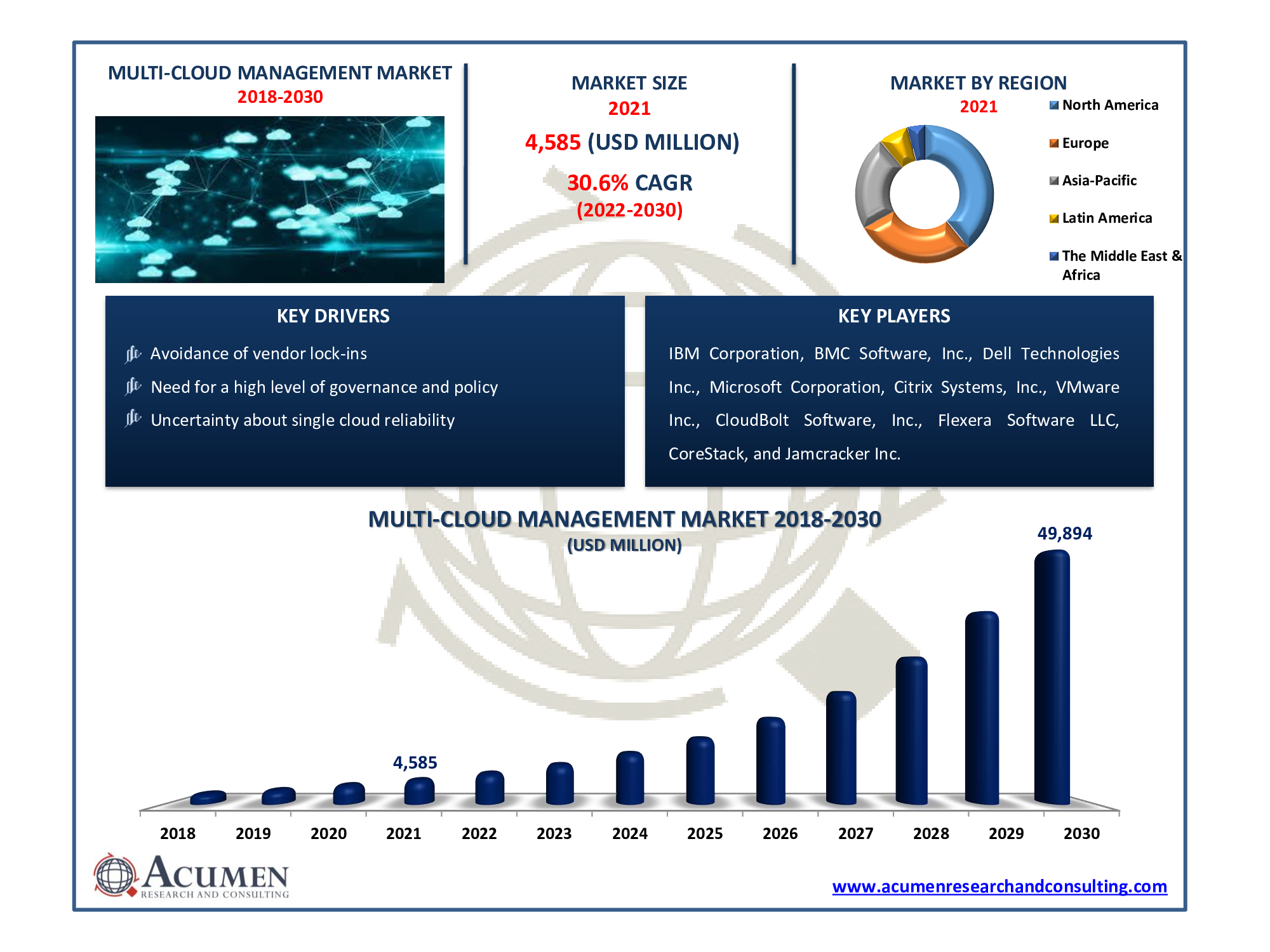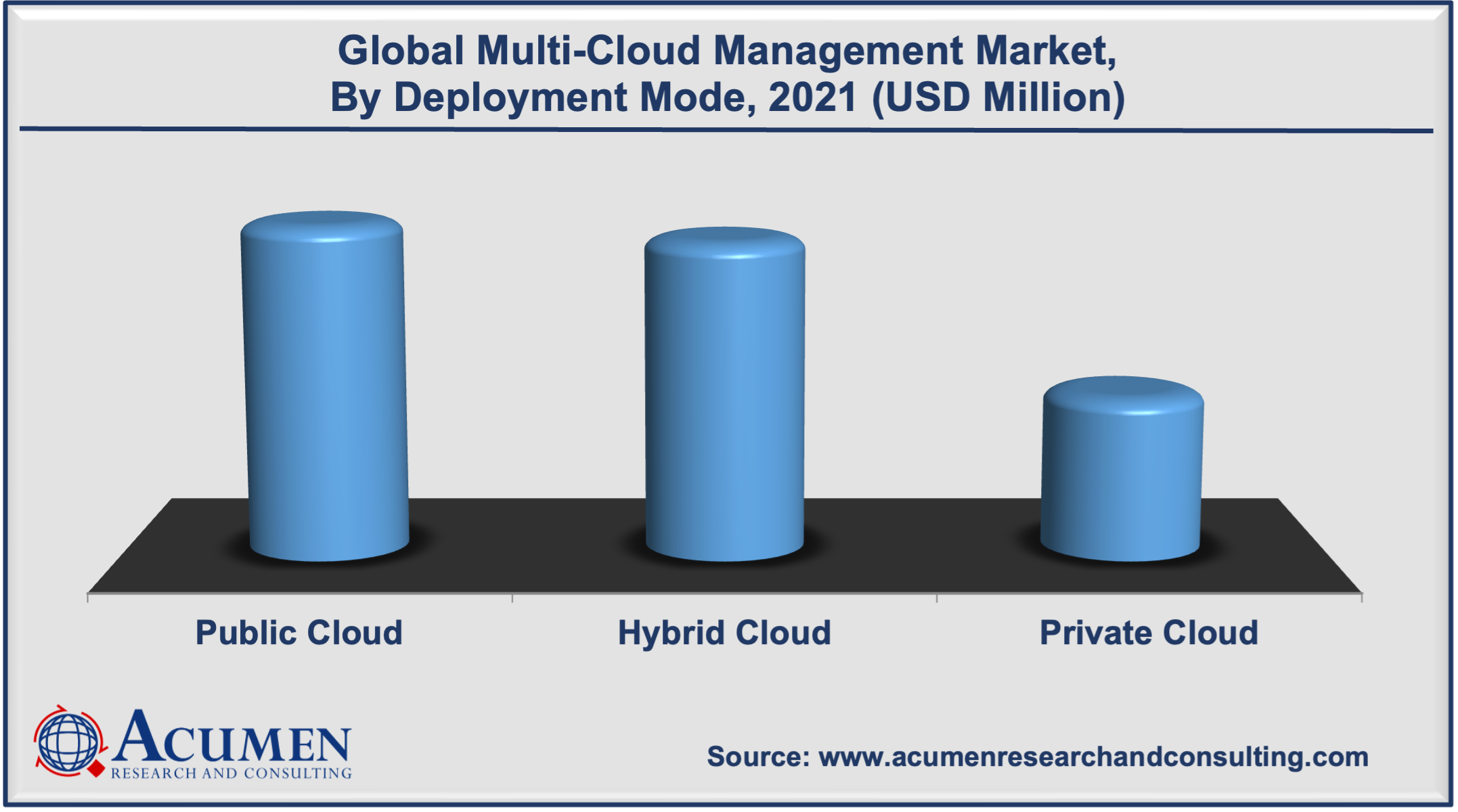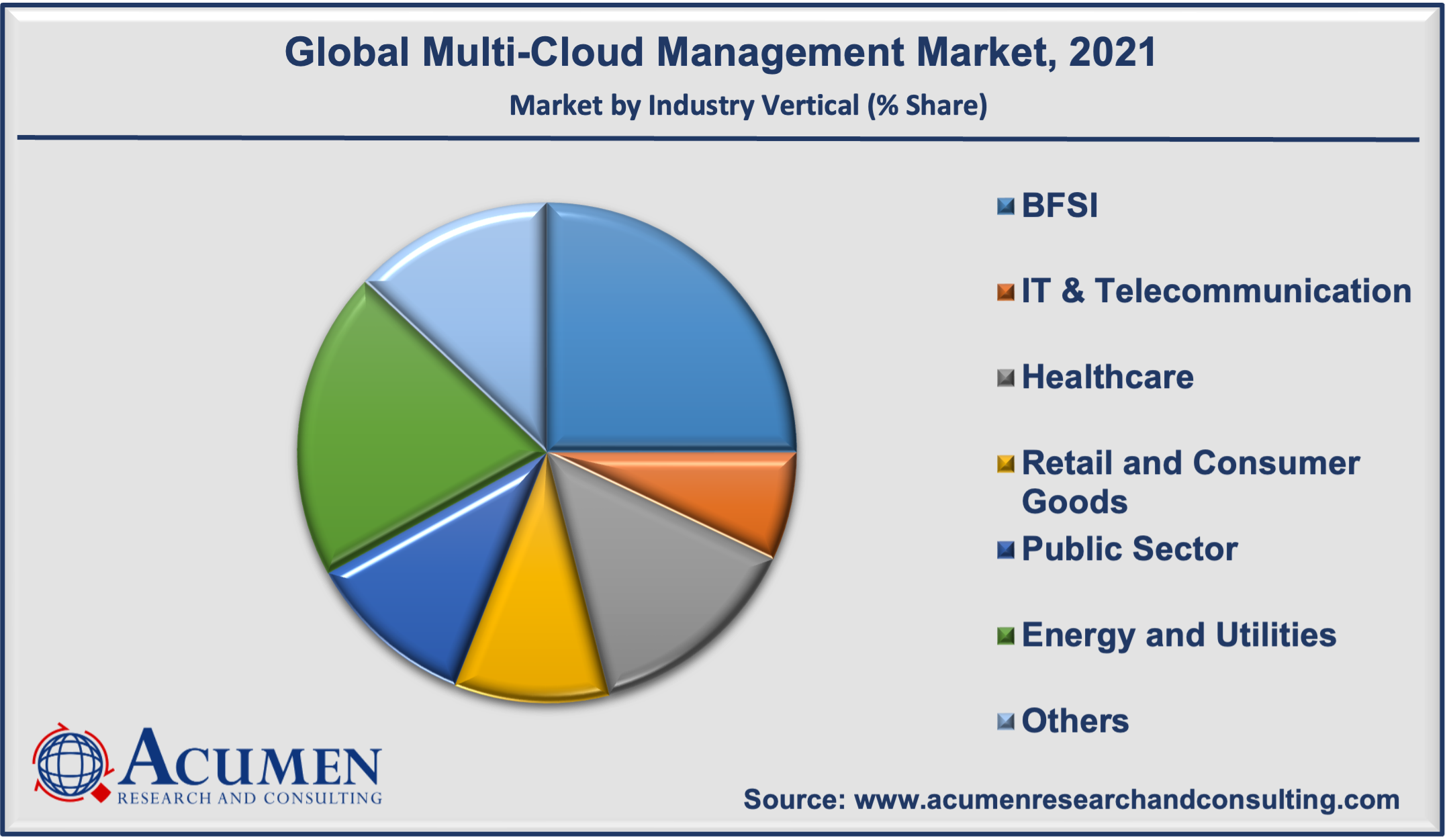Multi Cloud Management Market | Acumen Research and Consulting
Multi-Cloud Management Market Analysis - Global Industry Size, Share, Trends and Forecast 2022 - 2030
Published :
Report ID:
Pages :
Format : ![]()
The Global Multi-Cloud Management Market size was accounted for USD 4,585 Million in 2021 and is estimated to reach the market value of USD 49,894 Million by 2030.

According to our multi-cloud management industry analysis, the primary factor driving the market growth is the avoidance of vendor lock-ins. On the other hand, the recent multi-cloud management market trend that is fueling demand over the years is the uncertainty of single cloud services. As a result, the multi-cloud management market forecast witnessed a CAGR of 30.6% from 2022 to 2030.
Multicloud which enables the use of cloud services from two or more vendors provides organizations with greater flexibility to optimize performance, cut costs, and utilize the best cloud technologies available. It could be as simple as utilizing software-as-a-service (SaaS) from various cloud vendors, such as Salesforce and Workday. Multi-cloud is similar to hybrid cloud, but with one major distinction: in a multi-cloud, there are multiple cloud environments, but they may be completely separate or run different workloads. There is growing pressure for cloud management solutions as more organizations deploy their applications via private and public clouds. Multi-cloud management facilitates the generation of a unified and consistent system for managing cloud workflow and applications. In a nutshell, it organizes massive amounts of data to avoid overloads on only one cloud platform.
Multi-Cloud Management Market Dynamics
Market Growth Drivers:
- Avoidance of vendor lock-ins
- Need for a high level of governance and policy
- Uncertainty about single cloud reliability
- Growing inclination of organizations toward price-sensitive cloud deployments
Market Restraints:
- Difficulty in management of complex multi-cloud management system
- Application portability in various cloud environments
Market Opportunities:
- Growth in adoption of hybrid & public cloud
- Transformation opportunity for ISVs into SaaS providers
Report Coverage
| Market | Multi-Cloud Management Market |
| Market Size 2021 | USD 4,585 Million |
| Market Forecast 2030 | USD 49,894 Million |
| CAGR During 2022 - 2030 | 30.6% |
| Analysis Period | 2018 - 2030 |
| Base Year | 2021 |
| Forecast Data | 2022 - 2030 |
| Segments Covered | By Platform, By Deployment Mode, By Application, By Service, By Industry Vertical, And By Geography |
| Regional Scope | North America, Europe, Asia Pacific, Latin America, and Middle East & Africa |
| Key Companies Profiled | International Business Machines Corporation, BMC Software, Inc., Dell Technologies Inc., Microsoft Corporation, Citrix Systems, Inc., VMware Inc., CloudBolt Software, Inc., Flexera Software LLC, CoreStack, and Jamcracker Inc. |
| Report Coverage |
Market Trends, Drivers, Restraints, Competitive Analysis, Player Profiling, Regulation Analysis |
| Customization Scope |
10 hrs of free customization and expert consultation |
Avoidance of vendor lock-ins is one of the leading factors that fuel the worldwide multi-cloud management market growth. The classic use case for multi-cloud is to provide organizations with leverage while avoiding lock-in to a single cloud provider. Another factor driving market growth is the increasing adoption of multi-cloud management solutions by enterprises. In addition, uncertainty regarding single cloud reliability is positively influencing market growth during the forecast period.
The increasing need for agility and automation, as well as the rising necessity of effective governance processes in enterprises such as auto-provisioning, in which enterprise application rollout is faster and done automatically, and deployment can be accomplished to one or more clouds, is the primary driver for multi-cloud management. The increasing portability of applications across different cloud environments may be a constraint for the multi-cloud industry. Redesigning networks from on-premises to the cloud needs considerable upfront investment, which is difficult for SMEs with limited budgets and resources. Additionally, most businesses have found the transition to cloud deployment to be complex and costly, thereby restricting the multi-cloud management market growth.
Then again, adaptation of microservices for cloud-native softwares is anticipated to drive market growth in the coming years. Furthermore, the growing inclination of organizations towards price-sensitive cloud deployments is another factor that is expected to create numerous growth prospects for the market in the coming years.
Multi-Cloud Management Market Segmentation
The global multi-cloud management market segmentation is based on platform, deployment mode, application, service, industry vertical, and region.
Market by Platform
- Internal Brokerage Enablement
- External Brokerage Enablement
According to the platform, the internal brokerage enablement segment contributed the most multi-cloud management market value in 2021. This internal brokerage enablement platform is fostering the adoption of cloud-based services and applications across multiple verticals, which helps the segment to grow positively. However, the external brokerage enablement platform is expected to grow at the fastest rate between 2022 and 2030. The widening marketspace for cloud brokers around the world is credited with the segment's rapid growth.
Market by Deployment Mode
- Private Cloud
- Public Cloud
- Hybrid Cloud

The hybrid cloud deployment model is likely to register the fastest growth rate in the coming years.A hybrid cloud environment combines workload portability, coordination, and management across two or more computing environments, typically a mix of private (on-premise) and public (off-premise) clouds. Hybrid cloud methods are becoming more popular. According to a recent study, enterprises using a hybrid strategy (combining private and public clouds) increased to 58% in 2019 from 51% in 2018.
Market by Application
- Metering and Billing
- Provisioning
- Lifecycle Management
- Identity and Policy Management
- Infrastructure and Resource Management
- Compliance Management
- Others
Among all the applications, the lifecycle management segment is expected to register substantial growth throughout the forecast timeframe as it speeds up innovation by automating resource provisioning, and governance of usable cloud services. However, the compliance management segment achieved a considerable market share in 2021. While cloud computing offers agility and flexibility, it also splits the planning and approval procedures into different sections. It causes an increase in compliance issues in a multi-cloud environment, culminating in shadow IT, budget overruns, and security concerns.
Market by Service
- Cloud Automation
- Data Security & Management
- Migration & Integration
- Monitoring & Access Management
- Reporting & Analytics
- Training & Consulting
- Others
According to our analysis, the cloud automation service acquired a considerable market share in 2021. With proper automated systems and real-time syncs, multi-cloud provides an ideal environment for gathering and processing information. It is also an excellent storage and scalability solution because it allows companies to extend their storage up or down based on present demand. The migration and integration segment, on the other hand, will experience significant growth over the coming years. Migrating to a multi-cloud is a massive obstacle for most organizations, especially when multiple data centers, remote locations, and phone users are involved.
Market by Industry Vertical
- BFSI
- IT & Telecommunication
- Healthcare
- Retail and Consumer Goods
- Public Sector
- Energy and Utilities
- Others

According to verticals, BFSI will hold a sizable market share in the projected timeframe. BFSI firms generally prefer multi-cloud environments so that if one cloud fails, the other cloud can take over. Cloud solutions are being offered by vendors to financial institutions to secure their configurations and workloads while also ensuring regulatory compliance. Furthermore, key players trying to offer multi-cloud management are joining forces with BFSI industry incumbents to launch a new product into the market.
Multi-Cloud Management Market Regional Outlook
North America
- U.S.
- Canada
Europe
- U.K.
- Germany
- France
- Spain
- Rest of Europe
Latin America
- Mexico
- Brazil
- Rest of Latin America
Asia-Pacific
- India
- Japan
- China
- Australia
- South Korea
- Rest of Asia-Pacific
The Middle East & Africa (MEA)
- Gulf Cooperation Council (GCC)
- South Africa
- Rest of the Middle East & Africa
North America Multi-Cloud Management Market Accumulated The Leading Market Share In 2021
North America dominated the market with the highest share due to the rapid transition from isolated infrastructure to cloud and the region's high internet penetration rate. Europe is expected to be the market's second-biggest region in terms of market share because of its robust economic infrastructure and business demand for cloud services. Meanwhile, the rising popularity of cloud-based solutions and innovative technologies such as IoT and computing capabilities is driving the market in Asia-Pacific.
Multi-Cloud Management Market Players
Some of the top multi-cloud management companies offered in the professional report include International Business Machines Corporation, BMC Software, Inc., Dell Technologies Inc., Microsoft Corporation, Citrix Systems, Inc., VMware Inc., CloudBolt Software, Inc., Flexera Software LLC, CoreStack, and Jamcracker Inc.
Frequently Asked Questions
What was the market size of global multi-cloud management market in 2021?
The global multi-cloud management market size accounted for USD 4,585 Million in 2021.
What will be the projected CAGR for global multi-cloud management market during forecast period of 2022 to 2030?
The projected CAGR of multi-cloud management market during the analysis period of 2022 to 2030 is 30.6%.
Which are the prominent competitors operating in the market?
The prominent players of the global multi-cloud management market involve International Business Machines Corporation, BMC Software, Inc., Dell Technologies Inc., Microsoft Corporation, Citrix Systems, Inc., VMware Inc., CloudBolt Software, Inc., Flexera Software LLC, CoreStack, and Jamcracker Inc.
Which region held the dominating position in the global multi-cloud management market?
North America held the dominating share for multi-cloud management during the analysis period of 2022 to 2030.
Which region exhibited the fastest growing CAGR for the forecast period of 2022 to 2030?
Asia-Pacific region exhibited fastest growing CAGR for multi-cloud management during the analysis period of 2022 to 2030.
What are the current trends and dynamics in the global multi-cloud management market?
Avoidance of vendor lock-ins, need for a high level of governance and policy, and uncertainty about single cloud reliability drives the growth of global multi-cloud management market.
By segment deployment model, which sub-segment held the maximum share?
Based on platform, public cloud sub-segment held the maximum share for multi-cloud management market in 2021.


